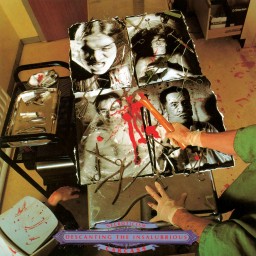 Review by Sonny for Carcass - Necroticism - Descanting the Insalubrious (1991)
Review by Sonny for Carcass - Necroticism - Descanting the Insalubrious (1991)
For context: despite not being a massive fan of death metal for the longest time and getting into the genre fairly late in the day, there is a small number of bands that I do have some history with, Carcass being one of them, Napalm Death and Bolt Thrower being the others. This is mainly due to all three being championed by the much-missed John Peel on his late night radio shows and the fact that they were from my neck of the woods, as I am from a shithole roughly at the midpoint between Merseyside and The Midlands and so they did get some promotion in local specialist record shops. This exposure was mainly focussed on their early grindcore material as by the time of Necroticism: Descanting the Insalubrious' release, I was on my self-imposed hiatus from the metal scene.
Anyway, personal history aside, Carcass' sophomore and predecessor to Necroticism, Symphonies of Sickness, saw Carcass evolve from the brutal grindcore of the debut in a more conventional death metal direction. Necroticism itself continues this evolution, further moving the band's sound away from their grindcore roots and introducing much more by way of melody into their writing with the grind elements being merely vestigial by this point. I am probably in the minority here, but I actually think that SoS marks the sweet spot between the grind and Death metal elements of Carcass' sound. That does not in any way mean I don't like Necroticism, quite the contrary in fact but, for me, SoS is the high water mark for Carcass, at least from a personal preference point-of-view. That said, there is loads to enjoy here, with memorable riffs thrown out like confetti, Bill Steer's growls competing with Jeff Walker's shrieks for vocal supremacy, a thunderous rhythm section and viscerally aggressive guitar solos.
The tracks on Necroticism are, in the main, even longer than those on Symphonies and, in addition to the increasing emphasis on melody there is also a more noticeable technicality about the songwriting. Necroticism also marks Michael Amott's recorded debut with the band and the interplay between him and Steer, particularly the solos, marks a major evolution for Carcass' sound with a more Maiden-esque approach, similar in effect to that of James Murphy's contributions with Death on Spiritual Healing. The emphasis on the solos is such that each even has a name: opener Inpropagation (a song about using cremated human remains as fertiliser), for example, has solos named "dust in the mausoleum", "compost humous horticulture" and "humanure". Elsewhere there are solos named "a heaving organic puzzle", "viscous residue snorting" and "administration of toxic compounds", continuing the gore-laden verbosity of their track and album naming convention.
The production is excellent and lies at the perfect point between the roughness of the earlier work and the slickness of their later releases, providing a thick and meaty quality to the riffing that still allows a flowing clarity to the leads during the solos and enables the rhythm section to be clearly discerned rather than them sinking into the mire of a muddier production. Drummer Ken Owen must receive kudos for turning in an understated, yet absolutely integral performance that lays a particularly solid foundation upon which the sterling guitar work could be built. The forensic gore aesthetic was something of a feature for the band and set them apart, seeming even more disturbing than the slasher gore of other early DM outfits like Cannibal Corpse, due to it's feet being placed more in the real world than the movie world and this provided inspiration to any number of later gorehounds. The samples that introduce a number of the tracks are suitably unpleasant and, I suppose, in a way they force us to face up to a certain distasteful aspect of life that most normal-minded people don't really dwell on much.
Overall, this is an important record in the evolution of a branch of death metal from it's earliest grindcore roots towards a more universally acceptable sound, whilst still retaining a brutally uncompromising aesthetic that was sufficient to prevent the band "selling-out" to mainstream acceptance.
